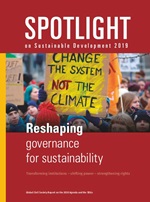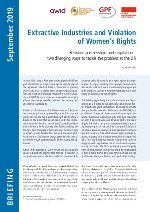Published on Thu, 2019-11-07 17:06
Increasingly, the International Monetary Fund (IMF) is claiming a role for itself as a central player in the implementation of the 2030 Agenda, and has positioned itself as an important actor on SDG 10 and tackling inequalities (economic and gender-based). However, in practice this commitment has been patchy at best, with little evidence of any meaningful policy realignment. Drawing on the examples of Egypt and Brazil, Kate Donald and Mahinour El-Badrawi, from CESR, and Grazielle David from the University of Campinas, show how IMF governance has led to deepening of social and economic inequalities, and threats to human rights enjoyment. |
Published on Thu, 2019-11-07 16:58
Paraguay has a history of “very low government revenue, generalized reluctance to pay taxes in a climate of corruption and strong opposition by enterpreneurs and high income earners to any increase in their fiscal contributions”, reports Decidamos, Campaign for Citizens' Expression. One of the few tax increases that the public accepts are the taxes on tobacco, as they generate revenue but also address a public health problem. Yet, a proposed law to increase taxes on tobacco to 40 percent was vehemently opposed by the producers and by former president Horacio Cartes (2013-2018), who owns the biggest tobacco company in the country. |
Published on Thu, 2019-11-07 16:41
The official Lebanese VNR report of 2018 blames the Syria crisis for the economic deficits that increased the debt, as well as for economic stagnation, the doubling of unemployment and worsening poverty rates. Yet, according to the alternative civil society report by the Arab NGO Network for Development (ANND), “this exclusively negative narrative about Syrian refugees does not distinguish between the huge impact of the Syrian crisis/war on the economy and political situation in Lebanon, and the diversified impact of the presence of the Syrian refugees in Lebanon. This latter allowed financial flow of aids to increase, as well as the domestic consumption that produced around 1 -1.5 percent of GDP growth, and provided a cheap labour force that prevented the bankruptcy of many small businesses.” |
Published on Thu, 2019-11-07 10:41
Official development assistance (ODA) and blended finance alone are insufficient in both quantum and nature to enable the finance needed to achieve the Sustainable Development Goals (SDGs), according to the UN Conference on Trade and Development (UNCTAD). This is one of the main conclusions highlighted by UNCTAD in a Secretariat Note presented at the third session of the Intergovernmental Group of Experts on Financing for Development taking place from 4-6 November. |
Published on Fri, 2019-10-25 08:29
Between partnerships and regulation – two diverging ways to tackle the problem at the UN The new briefing paper “Extractive Industries and Women’s Rights: Between partnerships and regulation – two diverging ways to tackle the problem at the UN”, by Karolin Seitz and published by AWID, DAWN, Global Policy Forum and Rosa-Luxemburg-Stiftung, presents how women are disproportionately affected by negative social and environmental impacts of extractive industries. The briefing also explains why a new partnership between UN Women and BHP Billiton, launched in June 2018, is very problematic. Similar to UN Women, other United Nations (UN) entities are trying to attract partnerships with the corporate sector. As the case of UN Women shows, potential risks and side-effects of such partnerships are often not properly addressed. |
SUSCRIBE TO OUR NEWSLETTER







